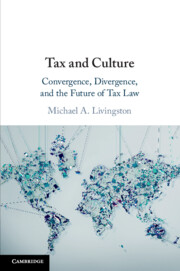Book contents
- Tax and Culture
- Tax and Culture
- Copyright page
- Contents
- Acknowledgments
- 1 Introduction: Comparative Law and Its Relevance to the Tax Field
- 2 Tax Anthropology: Attitudes, Behaviors, and the Role of Historical Contingencies
- 3 Tax Sociology: The Significance of Tax Institutions
- 4 Convergence, Divergence, and the Persistence of National Differences
- 5 Case Studies I: The Tax Cultures of Selected Western and Non-Western Countries
- 6 Case Studies II: Progressivity, Tax Avoidance, and Environmental Taxes
- 7 Conclusion: The Limits of Globalization and the Continuing Importance of Culture
- Index
2 - Tax Anthropology: Attitudes, Behaviors, and the Role of Historical Contingencies
Published online by Cambridge University Press: 13 March 2020
- Tax and Culture
- Tax and Culture
- Copyright page
- Contents
- Acknowledgments
- 1 Introduction: Comparative Law and Its Relevance to the Tax Field
- 2 Tax Anthropology: Attitudes, Behaviors, and the Role of Historical Contingencies
- 3 Tax Sociology: The Significance of Tax Institutions
- 4 Convergence, Divergence, and the Persistence of National Differences
- 5 Case Studies I: The Tax Cultures of Selected Western and Non-Western Countries
- 6 Case Studies II: Progressivity, Tax Avoidance, and Environmental Taxes
- 7 Conclusion: The Limits of Globalization and the Continuing Importance of Culture
- Index
Summary
As observed in Chapter 1, the definition of culture is complicated, calling to mind Justice Potter Stewart’s admonition that he could never quite define pornography but “I know it when I see it.” For convenience, we may divide culture into its attitudinal aspects – the knowledge, belief, and behavior part of the definition in Chapter 1 – and its institutional component, which concerns the values and practices that characterize a particular institution or organization. Of course, these two aspects overlap in practice since institutional structures are founded on knowledge while beliefs are determined to a large degree by the institutional structures in which they arise; yet the distinction remains useful.
- Type
- Chapter
- Information
- Tax and CultureConvergence, Divergence, and the Future of Tax Law, pp. 15 - 31Publisher: Cambridge University PressPrint publication year: 2020

